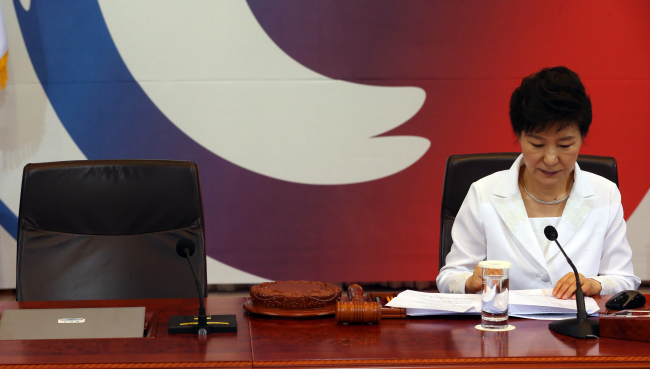President Park Geun-hye’s reform efforts aimed at improving safety measures and ending corruption in offices were dealt with a serious blow on Thursday.
Prime Minister nominee Ahn Dae-hee, who has been hailed as a corruption fighter, withdrew his nomination on Wednesday afternoon, saying he would be “a burden to the government” if he kept the nomination. Ahn’s abrupt announcement came amid a growing speculation that he made a fortune by using his connections with former colleagues to get preferential treatment.
Ahn’s resignation is expected to leave a significant vacuum in Park’s reform drive initiated in the wake of the Sewol tragedy. The president said she would give larger authority to the new prime minister to end corruptive practices in public offices, seen as a factor that caused the Sewol disaster.
 |
| President Park Geun-hye looks at documents after speaking at Tuesday’s Cabinet meeting at Cheong Wa Dae. (Yonhap) |
The president vowed to bring drastic changes to her administration by launching new ministries to improve the country’s safety standards and work efficiency.
She also plans to name a new deputy premier to handle social issues, in an apparent attempt to regain public confidence.
The series of government reorganization plans is widely seen as an attempt to move on from the ferry tragedy, which left more than 300 dead or missing.
But the plans have been criticized, as they were only proposed a year after Park’s reshuffle when she took the office early last year.
Her recent restructuring plan, introduced only one month after the Sewol accident, has been called reckless and inconsistent.
Critics say that she should have spent more time on her decision, because it requires substantial changes in the officialdom along with budget issues, and the plan could cause greater confusion.
The key criticism of Park’s reorganization scheme is that it keeps changing.
Last week, the president said she would dismantle the Coast Guard because of its failures during the Sewol rescue mission, and transfer key functions from the Ministry of Security and Public Administration to a new ministry to be established under the Prime Minister’s Office.
A week later at a Cabinet meeting on Tuesday, Park reversed the plan, saying she would let the public administration ministry keep some of its functions. Under the new plan, the ministry would continue management of organizations at central and local governments. Only its authority over personnel issues would be transferred to other ministries.
In a surprise move, the president said she would also have a second deputy prime minister to handle educational, social and cultural issues, arguing that noneconomic areas also required a “control tower.” The Park administration currently has one deputy prime minister who oversees economic affairs and a national security adviser in Cheong Wa Dae to handle security affairs.
Yoo Min-bong, senior presidential secretary for state affairs planning, told reporters following the meeting that the plan was to improve officials’ efficiency and increase their responsibilities. It is also seen as Park’s determination to partly delegate more power, as critics have argued that the president’s power is excessive.
Yoo also said that the Ministry of Security and Public Administration would be reduced to the ministry of public administration and autonomy after having its duties on safety and personnel issues transferred to other ministries.
The restructuring plan is likely to face fierce opposition at the National Assembly. The envisioned changes to the government are subject to parliamentary approval.
The main opposition New Politics Alliance for Democracy cochairman Ahn Cheol-soo lashed out at the president, questioning the sincerity of the plan.
“The restructuring plan is a mere show that just changes the name of the ministry,” Ahn said at a meeting. “We need to have a fundamental measure, not just a pretense of action.”
By Cho Chung-un (christory@heraldcorp.com)

